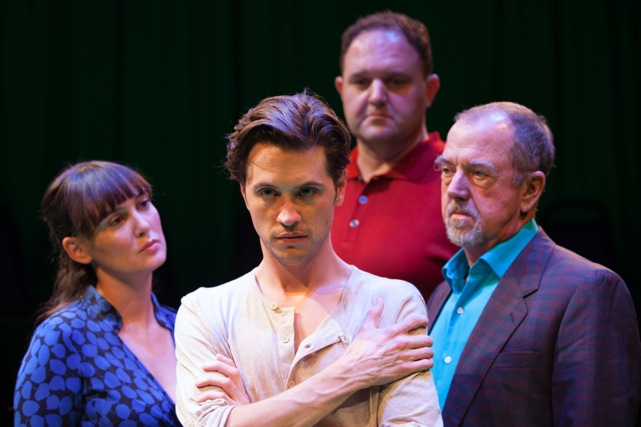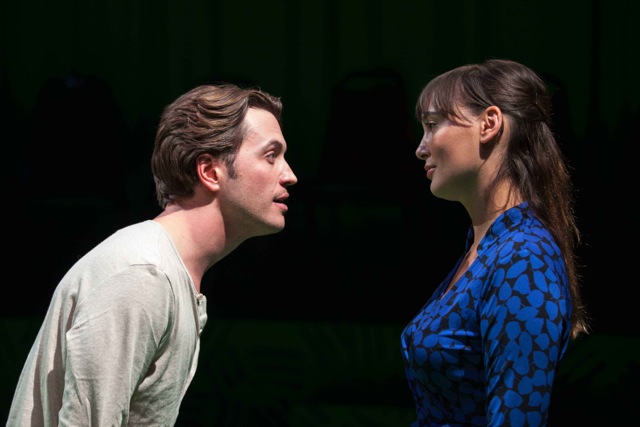'Cock' Teases And Provokes At Rogue Machine Theatre

The play follows John (Patrick Stafford), a gay man grappling with his identity in the midst of a lusty love triangle that threatens to push him over the edge. After breaking up with his partner of seven years, known only to us as M (Matthew Elkins), John sleeps with a woman for the first time, W (Rebecca Mozo) and finds himself in an identity crisis. The play builds to a human cockfight as John tries to decide who he is and who he wants to be with, while being pulled at from all sides, including M’s father F (Gregory Itzin).
"Cock" was written by Mike Bartlett, a British playwright who was nominated for a BAFTA award last year for Best Breakthrough Talent and has been on the rise since "Cock’s" premiere at the Royal Court in London in 2010. The language comes to the forefront in this play, as its avant-garde staging demands that actors and audiences alike pay heed to the text above all else.
SEE ALSO: Deaf West's 'Spring Awakening' Is A Conceptual Masterpiece

This staging conceit lays the emotional lives of the characters bare, so that the crispness and immediacy of the text take center stage. Almost to an uncomfortable degree, the audience is left with no choice but to fixate on the emotional journey the characters undergo through their words. This is further facilitated by the set design (by Stephen Gifford), a stark space painted in a neon green color that calls to mind Hollywood green screens. The green screen’s purpose is to disappear replaced by performance and action — and the set does just this, leaving us with the actors and their dialogue, as the surrounding space fades into the background.
The cast is strong across the board with particular stand-out performances from Mozo and Stafford. Every moment of their performances ring true with a visceral intensity. In a such a small space (the theater only holds approximately 50 people) and with no sets, costumes, or props to hide behind, the audience would be able to spot even the slightest hint of falseness in a performance.
SEE ALSO: David Mamet's 'Race' Attempts To Tackle Complicated Issues
John is utterly lost and paralyzed by his indecision -- Stafford brings this alive in a poignant, heart-rending manner often sheerly through his expressive eyes or a small twitch of the face. Mozo breathes fierce life into the woman that could be his salvation or his destruction. Her pain and her helplessness in the face of love and maddening indecision give plaintive depth to an initially inscrutable character. As a female character, she is not defined by a man so much as she wishes he would define himself by her.
Though all elements of the production are strong, what makes it such a distinct and fascinating piece is the masterful direction from Cameron Watson. Having assistant directed two productions with Watson myself, I am familiar with his directing style, and I am always struck by the essential truth and humanness he brings out of every play and actor who come across his path. He brings a specificity out in his actors without ever explicitly telling them what to do, allowing moments to develop organically and with the truth of the actor's experience at their core. His ability to draw that truth out so that no moments in his plays ring false is what truly makes "Cock" special because its success rides on the honesty of the text and the performances.
So often, Los Angeles is not considered a "theatre town," but "Cock" is a thrilling example of why that myth should and can be dispelled. In a small nondescript building across from Roscoe's Chicken and Waffles on Pico Boulevard, some of the most raw, provocative, challenging theatre you'll have the chance to encounter is happening. Don't miss it.
"Cock" is playing through November 3rd at Rogue Machine Theatre (5014 W. Pico Blvd, Los Angeles). Tickets are $30. For more information visit www.RogueMachineTheatre.com.
Contact Maureen Lee Lenker here or follow her on Twitter.
For more Theater & Dance coverage click here.



